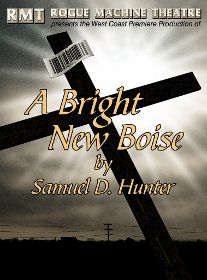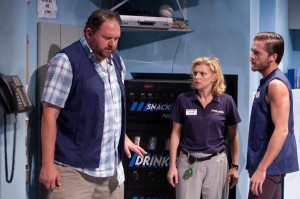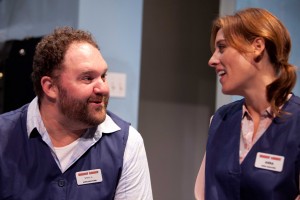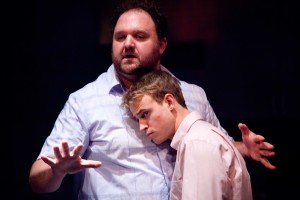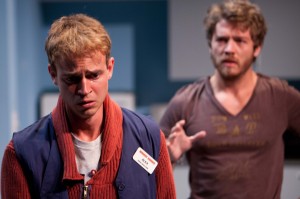HIS OWN PRIVATE BOISE
We’re in Boise, Idaho, in the break room of an arts and craft chain store called Hobby Lobby. Two men appear on closed circuit television doing a sort of home shopping channel patter about their wares. (They also break the fourth wall and do the announcement about turning off cell phones and refraining from flash photography’”a droll choice.) As a manager interviews a potential new employee, we learn of the chain’s deeply anti-union, Big Brother ethos. The Hobby Lobby channel is sent via satellite to all of their stores across the country; though it sometimes gets its signals crossed with a channel airing painfully graphic footage of surgical procedures.
Pain, conformity, creativity, and unfairness permeate the lives of the people who work for Hobby Lobby, just as they permeate the larger story at the heart of this play. It’s the story of a man trying to reconnect with the son he gave up for adoption. We learn that this man has a tangled story of religious fundamentalism and belief in a coming rapture, and that the leader of his church is under indictment for his involvement in the death of a young man.
A Bright New Boise by Samuel D. Hunter is stunning’”in its form, its approach, its language, and in its nuanced exploration of subject matter, that if treated differently, would be juicy fodder for a Lifetime movie. The rapture is both literal and metaphorical antidote to poverty, loneliness, and the unbearable loss of hope that lurks at the edges of the characters’ lives.
Matthew Elkins plays Will, the tortured man in the eye of this storm, with transcendent simplicity. His yearning for connection’”with his long lost son, with God, with anyone’”is achingly human; and so moving that we forget about the consequences of his faith. We forget that Will thinks we’re all going to hell for not believing precisely as he believes.
We forget that Will is out of his mind. He sees the world as intolerably ugly’”dreaming of the bright new beauty that will come when God’s fiery wrath cleanses us all.
Elkins’ great achievement here is in normalizing a person we might not imagine we can like or understand. Elkins is utterly convincing’”as is the whole cast. Every performance is genuine. Every moment is calibrated to a rhythm dictated by the play itself, rather than by the individual need for attention. There myriad opportunities in the show to steal focus, but seemingly no desire to do so amongst the actors.
As the store’s manager, Pauline, Betsy Zajko gets plenty of laughs, but she gets them by embodying the comically desperate seriousness of the character. She isn’t commenting on Pauline’s obsessive need for control, she’s just living it. She has a great running gag about “Fucking Mandy,” an employee we never meet who is a constant irritant.
Erik Odom is Alex, the young man meeting a father he never knew. Odom doesn’t rush for the Sturm und Drang of Alex’s severe anxiety attacks, his enraged sense of abandonment and isolation, nor the character’s startlingly bad attempts at angry performance art. Odom just lets the words transport him to the places he must inhabit. He trusts the material, himself, and the other actors. “What do you want from me?” he asks Will, not waiting for an answer before declaring with no extra emphasis, “You better not need a kidney or anything.”
As Leroy, Boise’s answer to the lone wolf artist, who turns out to be Alex’s foster brother, Trevor Peterson is all angles, angst, tight pants, and vulgar t-shirts’”that Leroy designs himself. He is proudest of the one that declares: “You will eat your children.” Leroy deliberately makes the other characters uncomfortable and then tells them exactly what he’s doing and why. He ham-fistedly tries to protect Alex from Will, believing rightly or wrongly that all Will wants is to drag Alex into a cult of death-infatuated freaks.
Rounding out the cast is Heather L. Tyler as Anna, an almost pathologically nervous young woman who sneaks back into the store at night to read books’”hoping for some moments of peace from her overbearing father and brothers at home. Anna is truly a failure at everything she tries’”and she becomes the unwitting catalyst to Will’s total unraveling. When he comes at her full of righteous indignation, it’s terrifying. Tyler is quite moving as she conveys Anna’s tender inability to understand the world in which she lives’”let alone the people in it’”most of whom she finds mystifying and threatening.
David Mauer’s scenic design and technical direction is grubby and haunting by turns’”remarkably expansive in a small space. The naturalistic employee break room set feels claustrophobically authentic as it bears down on those unlucky enough to work at Hobby Lobby; but when Will is meant to be outside, in spiritual torment, the theater feels gigantic. Mauer’s work is deftly complimented by Leigh Allen’s marvelous lighting.
John Perrin Flynn directs the production with an eye for revelatory behavior and emotional honesty. His passion for his actors is viscerally evident; he loves them and it shows. Hunter won an Obie for this play, now making its west coast premiere. One word: Bravo.
photos by John Flynn
A Bright New Boise
Rogue Machine Theatre
scheduled to end on December 9, 2012 EXTENDED through December 17, 2012
for tickets, call (855) 585-5185 or visit http://www.roguemachinetheatre,com
